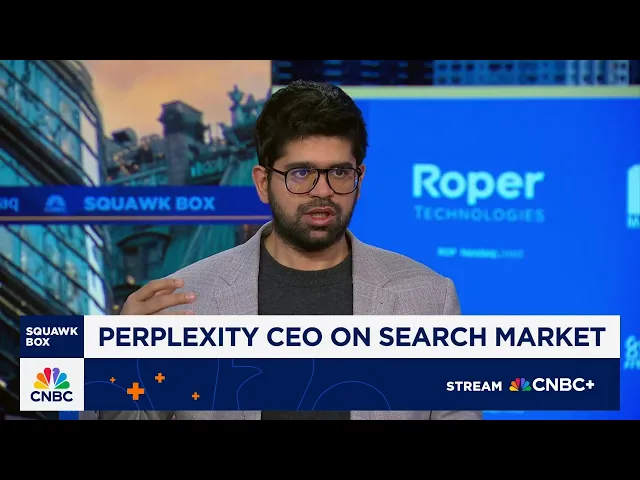Perplexity CEO on AI race: The market of providing answers to questions will become a commodity

AI search race could commoditize answers soon
In the rapidly evolving landscape of artificial intelligence and search technology, Perplexity CEO Arvind Srinivas offers a candid assessment of where the industry is headed. During a recent interview, Srinivas shared insights on Perplexity's approach to AI-powered search, the company's competitive positioning against tech giants, and his surprising perspective on potential Google breakups. As the antitrust case against Google unfolds, Perplexity represents a new generation of search alternatives gaining significant traction.
Key insights from Perplexity's CEO:
- The market for basic AI question-answering will soon become commoditized as multiple companies offer similar capabilities
- Perplexity differentiates itself through superior efficiency, offering "the cheapest API right now along with the highest accuracy"
- Future value will come from multi-step workflows, research capabilities, and "agents" that can manage complex tasks beyond simple searches
- Despite competing with Google, Perplexity opposes breaking up Chrome from the open-source Chromium project that powers many browsers
The inevitable commoditization of AI search
The most striking takeaway from Srinivas's interview is his matter-of-fact acknowledgment that basic AI search functionality will become a commodity. "This market of just providing answers to questions will be a commodity," he stated plainly. "One year ago, it was not a commodity… but now many people are going to do the same thing."
This perspective matters profoundly as we witness a fundamental restructuring of the information access industry. For decades, Google has dominated search with a business model built on capturing user attention through search results and selling adjacent advertising. The new AI-powered search paradigm threatens this model by providing direct answers rather than a list of links. As Srinivas predicts, once the novelty wears off and the technology becomes ubiquitous, the real differentiation will happen at higher levels of functionality.
Companies winning in this space will need to develop what Srinivas calls "actions" – complex, multi-step processes that go beyond answering simple questions. Imagine an AI that doesn't just answer "how are tariffs affecting my investments?" but one that proactively analyzes your portfolio, reads daily news about relevant policies, an
Recent Videos
How To Earn MONEY With Images (No Bullsh*t)
Smart earnings from your image collection In today's digital economy, passive income streams have become increasingly accessible to creators with various skill sets. A recent YouTube video cuts through the hype to explore legitimate ways photographers, designers, and even casual smartphone users can monetize their image collections. The strategies outlined don't rely on unrealistic promises or complicated schemes—instead, they focus on established marketplaces with proven revenue potential for image creators. Key Points Stock photography platforms like Shutterstock, Adobe Stock, and Getty Images remain viable income sources when you understand their specific requirements and optimize your submissions accordingly. Specialized marketplaces focusing...
Oct 3, 2025New SHAPE SHIFTING AI Robot Is Freaking People Out
Liquid robots will change everything In the quiet labs of Carnegie Mellon University, scientists have created something that feels plucked from science fiction—a magnetic slime robot that can transform between liquid and solid states, slipping through tight spaces before reassembling on the other side. This technology, showcased in a recent YouTube video, represents a significant leap beyond traditional robotics into a realm where machines mimic not just animal movements, but their fundamental physical properties. While the internet might be buzzing with dystopian concerns about "shape-shifting terminators," the reality offers far more promising applications that could revolutionize medicine, rescue operations, and...
Oct 3, 2025How To Do Homeless AI Tiktok Trend (Tiktok Homeless AI Tutorial)
AI homeless trend raises ethical concerns In an era where social media trends evolve faster than we can comprehend them, TikTok's "homeless AI" trend has sparked both creative engagement and serious ethical questions. The trend, which involves using AI to transform ordinary photos into images depicting homelessness, has rapidly gained traction across the platform, with creators eagerly jumping on board to showcase their digital transformations. While the technical process is relatively straightforward, the implications of digitally "becoming homeless" for entertainment deserve careful consideration. The video tutorial provides a step-by-step guide on creating these AI-generated images, explaining how users can transform...
